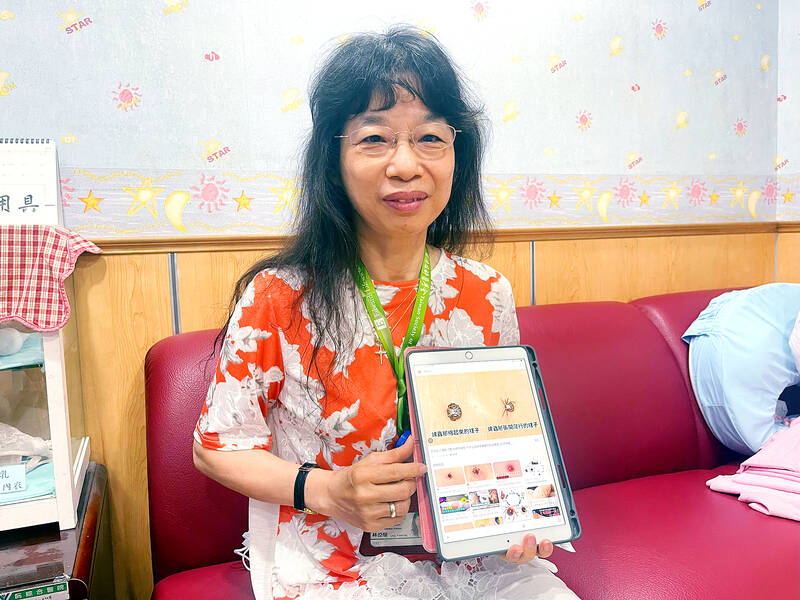A doctor has urged people to beware of tick bites when traveling abroad after finding a tick on a woman who had recently traveled to Japan.
The woman, who had traveled to Japan’s Tohoku region, experienced pain in one of her shoulders for 10 days after returning to Taiwan and sought medical help, online news site the Apple Daily reported on Sunday.
Lin Kung-kai (林工凱), a doctor at a dermatology clinic in Kaohsiung who treated the woman, was quoted as saying that he found a lump with fine black threads on the woman’s shoulder.

Photo: Hsu Li-chuan, Taipei Times
Upon closer inspection, he realized that it was a tick stuck under her skin with its legs left outside.
He removed the insect with a pair of tweezers and prescribed antibiotics to the woman, and asked her to return for follow-up examinations.
Lin said ticks are arthropods that are commonly found in the wilderness and are most active from April to October.
People might pick up ticks as they walk through grassland or forests, he said.
Lin also urged caution against Lyme disease, which is spread by infected ticks.
Symptoms of Lyme disease include a red expanding rash, fever and fatigue within three to 30 days of having been bitten by a tick, he said, adding that delayed treatment could lead to serious complications.
Lyme disease is caused by the bacterium Borrelia burgdorferi, which is transmitted to humans through the bite of infected ticks, the Centers for Disease Control said.
However, the pathogen is not transmissible between humans, it said.
Lyme disease caused by tick bites usually affects mammals, including humans, rodents, dogs, cats, cows, horses and deer, it added.
Lin said people who are traveling to wooded or grassy places in areas where Lyme disease is endemic should avoid sitting on the ground for too long; wear protective clothing such as long sleeves, gloves and boots; and use insect repellents containing DEET or picaridin, to prevent tick bites.

The first global hotel Keys Selection by the Michelin Guide includes four hotels in Taiwan, Michelin announced yesterday. All four received the “Michelin One Key,” indicating guests are to experience a “very special stay” at any of the locations as the establishments are “a true gem with personality. Service always goes the extra mile, and the hotel provides much more than others in its price range.” Of the four hotels, three are located in Taipei and one in Taichung. In Taipei, the One Key accolades were awarded to the Capella Taipei, Kimpton Da An Taipei and Mandarin Oriental Taipei. Capella Taipei was described by

The Taichung District Court yesterday confirmed its final ruling that the marriage between teenage heir Lai (賴) and a man surnamed Hsia (夏) was legally invalid, preventing Hsia from inheriting Lai’s NT$500 million (US$16.37 million) estate. The court confirmed that Hsia chose not to appeal the civil judgement after the court handed down its ruling in June, making the decision final. In the June ruling, the court said that Lai, 18, and Hsia, 26, showed “no mutual admiration before the marriage” and that their interactions were “distant and unfamiliar.” The judge concluded that the couple lacked the “true intention of

EVA Airways today confirmed the death of a flight attendant on Saturday upon their return to Taiwan and said an internal investigation has been launched, as criticism mounted over a social media post accusing the airline of failing to offer sufficient employee protections. According to the post, the flight attendant complained of feeling sick on board a flight, but was unable to take sick leave or access medical care. The crew member allegedly did not receive assistance from the chief purser, who failed to heed their requests for medical attention or call an ambulance once the flight landed, the post said. As sick

INDUSTRY: Beijing’s latest export measures go beyond targeting the US and would likely affect any country that uses Chinese rare earths or related tech, an academic said Taiwanese industries could face significant disruption from China’s newly tightened export controls on rare earth elements, as much of Taiwan’s supply indirectly depends on Chinese materials processed in Japan, a local expert said yesterday. Kristy Hsu (徐遵慈), director of the Taiwan ASEAN Studies Center at the Chung-Hua Institution for Economic Research, said that China’s latest export measures go far beyond targeting the US and would likely affect any country that uses Chinese rare earths or related technologies. With Japan and Southeast Asian countries among those expected to be hit, Taiwan could feel the impact through its reliance on Japanese-made semi-finished products and